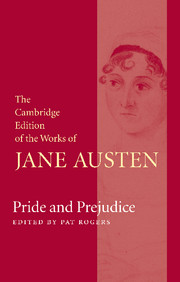Book contents
- Frontmatter
- Contents
- General Editor’s Preface
- Acknowledgements
- Chronology
- Introduction
- Note on the Text
- Pride and Prejudice
- Pride and Prejudice: Volume I
- Pride and Prejudice: Volume II
- Pride and Prejudice: Volume III
- Corrections and Emendations to 1813 text
- Appendix 1 Thomas Egerton and the Publication History
- Appendix 2 Legal and Military Background
- Appendix 3 Pemberley and its Models
- Appendix 4 Note on the second and third editions of Pride and Prejudice
- Abbreviations
- Explanatory Notes
Appendix 2 - Legal and Military Background
Published online by Cambridge University Press: 19 December 2020
- Frontmatter
- Contents
- General Editor’s Preface
- Acknowledgements
- Chronology
- Introduction
- Note on the Text
- Pride and Prejudice
- Pride and Prejudice: Volume I
- Pride and Prejudice: Volume II
- Pride and Prejudice: Volume III
- Corrections and Emendations to 1813 text
- Appendix 1 Thomas Egerton and the Publication History
- Appendix 2 Legal and Military Background
- Appendix 3 Pemberley and its Models
- Appendix 4 Note on the second and third editions of Pride and Prejudice
- Abbreviations
- Explanatory Notes
Summary
Guides to Jane Austen's work often have an article on medicine, but none on the law. While her grandfather was a surgeon in Tonbridge, several family members were deeply embroiled in legal affairs. A crucial figure here is her great-uncle Francis Austen (1698–1791), the most successful member of the family in worldly terms. Starting out with very little, he became a prosperous lawyer in Sevenoaks, and clerk of the peace for Kent. As guardian he may have paid for the education of Jane's father (although this may be legend); and when Rev. George Austen became perpetual curate of Shipbourne in 1755 it was probably owing to Francis. Two years before Jane's birth Francis Austen enabled his nephew George to acquire the living at Deane, near the family home at Steventon. His concern for the family in Hampshire continued, as he served as godfather to Jane's eldest brother James in 1765. Later his second wife Jane was a godmother of Jane herself. In addition he had acted as trustee for Tysoe Hancock, the East India Company surgeon who had married Philadelphia Austen, sister of Mr Austen. Such facts illustrate the way in which Francis Austen used his financial independence and social prestige for the benefit of family members, and in particular for the good of his comparatively poor relatives in Steventon.
Prudently, George and Cassandra kept on good terms with their principal benefactor, and took some of their children at intervals to make his acquaintance. In 1788 it was the turn of the twelve-yearold Jane to visit her great-uncle Francis, now aged ninety, at his home in Sevenoaks. He lived three more years, and at his death he left George £500 in his will (National Archives, PROB 11/206). As effectively head of the family, so far as the direct Austen line went, he clearly exercised an important role in determining the prospects of the Hampshire branch, not least the growing brood of children produced by Cassandra and George.
- Type
- Chapter
- Information
- Pride and Prejudice , pp. 441 - 451Publisher: Cambridge University PressPrint publication year: 2006



